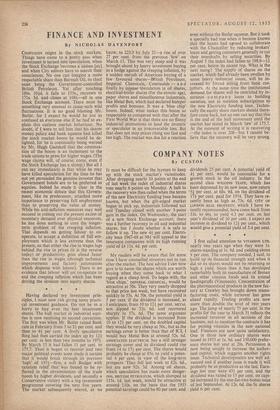FINANCE AND INVESTMENT
By NICHOLAS
DAVENPORT
CONFUSION reigns in the stock markets. Things have come to a pretty pass when investment is turned into speculation, when the Stock Exchange becomes a casino [sic] and when City editors have to search their consciences. No one can imagine a more respectable share than Burmah Oil, its chief asset being the Government-controlled British Petroleum. Yet after touching 186s. 10fd. it falls to 155s., recovers to 171s. 3d. and closes at 168s.-all in one Stock Exchange account. There must be something very unusual to cause such wild fluctuations. It is no good blaming Mr. Butler, for I expect he would be just as confused as everyone else if he had to ex- plain this curious market behaviour. No doubt, if I were to tell him that his dearer money policy and bank squeeze had killed the stock market boom he would be de- lighted, for he is continually being warned by Mr. Hugh Gaitskell that the continua- tion of the boom is an incitement to the trade unions to press for higher wages. (The wage claims will, of course, come, even if the Stock Exchange has a slump.) But all I can say immediately is that while he may have killed speculation for the time he has not yet persuaded the genuine investor that Government bonds are to be preferred to equities. Indeed he made it clear in the recent economic debate that this Govern- ment, like its predecessor, attached more importance to preserving full employment than to preserving the value of money. While his anti-inflation measures may well succeed in cutting out the present excess of monetary demand over physical resources, he has done nothing to cure the longer- term problem of the creeping inflation. That depends on getting labour to co- operate, to accept a definition of full WI-, ployment which is less extreme than the present, so that either the rise in wages lags behind the rise in prices (it is the reverse today) or productivity goes ahead faster than the rise in wages, (through technical improvements and factory automation which dispense with labour). There is no evidence that labour will yet co-operate to end the creeping inflation which has been driving the investor into equity shares.
Having declared my investment prin- ciples, I must now risk giving some practi- cal investment guidance. Do not be in a hurry to buy even the best investment shares. The bull market in industrial equi- ties is now receiving its second correction. The first was when Mr. Butler raised Bank rate in February from 3 to 3+ per cent. and then to 41 per cent. A lively speculative fling had then carried the index up by 12+ per cent. in less than two months to 197+. By March 15 it had fallen 11 per cent. to 175.7. Then it began to recover and two major political events soon made it certain that it would break through its previous `high' of 1971-first, a soft Budget with taxation relief that' was bound to be re- flected in the circumstances of the trade boom by higher dividends, and secondly a Conservative victory with a big investment programme covering the next five years. The market subsequently soared, as we
know, to 223.9 by July 21-a rise of over 27 per cent. from the previous low' on March 15. This was very steep and it was brought about by heavy investment buying as a hedge against the creeping, inflation, by a sudden onrush of American buying of a few favoured shares-British Petroleum, Imperial Chemicals, Courtaulds - a n d finally by intense speculation in oil shares, electrical-boiler shares (for the atomic age), paper shares and miscellaneous industrials, like Metal Box, which had declared bumper profits and bonuses. It was a 'blue chip' boom. Indeed, what makes this boom so respectable as compared with that after the First World War is that there are no flimsy industrial promotions to land the investor or speculator in an irrecoverable loss. But that does not stop prices rising too fast and too high. The market was due for a reaction even without the Butler squeeze. But it took a specially bad toss when it became known that the banks had agreed to, collaborate with the Chancellor by reducing brokers' loans and getting customers generally to cut their overdrafts by selling securities. By August 3 the index had fallen to 198.9-11 per cent. below its recent top. What is the next move? The supply of shares on the market, which had already been swollen by some heavy industrial issues, will be in- creased by forced selling from bank cus- tomers. At the same time the institutional demand for shares will be restricted by in- surance ,c o m pan y loans to building societies, not to mention subscriptions to the new Electricity funding loan. Techni- cally the equity share markets should there- fore come back, but no one can say that this is the end of the bull movement until the market has tested its March `low' of 175.7. At the moment of writing it is recovering -the index is over 208-but I cannot be- lieve that the recovery will be very strong.


































 Previous page
Previous page